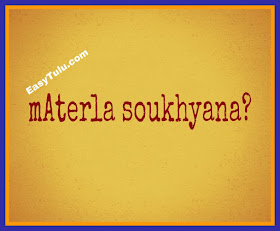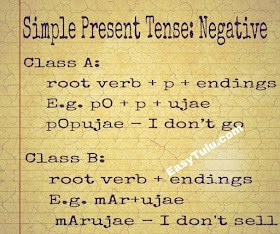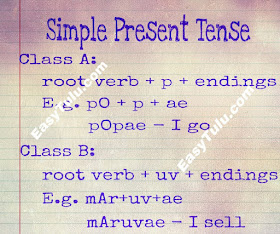namaskAra! encha ullar?
Hopefully you are enjoying the lessons. Please let me know
if you have any questions that you think I can answer!
Last week we learnt numbers from 1 to 20 in Tulu. Today we
are going to learn more numbers, ordinal numbers and how to tell the time.
onji – 1
raDD – 2
mUji – 3
nAl – 4
ain – 5
Aji – 6
El – 7
enma – 8
orumba – 9
patt – 10
pattonji – 11
padiraDD – 12
padimUji – 13
padinAl – 14
padinain – 15
padinAji – 16
padinEl – 17
padinenma – 18
padinorumba – 19
irva – 20
irvattonji - 21
irvatraDD - 22
irvatmUji - 23
irvatnAl - 24
irvattain - 25
irvattAji - 26
irvattEl - 27
iravattenma - 28
irvattorumba - 29
muppa - 30
muppattonji - 31
muppatraDD - 32
…………
muppattorumba - 39
muppattorumba - 39
nalpa - 40
nalpattonji - 41
nalpatraDD - 42
………..
nalpattorumba - 49
aiva - 50
aivattonji - 51
aivatraDD - 52
…………..
aivattorumba - 59
ajipa - 60
ajipattonji - 61
ajipatraDD - 62
………….
ajipattorumba - 69
elpa - 70
elpattonji - 71
elpatraDD - 72
………….
elpattorumba - 79
enpa - 80
enpattonji - 81
enpatraDD - 82
……………
enpattorumba - 89
sonpa - 90
sonpattonji - 91
sonpatraDD - 92
…………..
sonpattorumba - 99
nUdu - 100
nUta onji - 101
nUta raDD - 102
nUta patt - 110
nUta sonpa - 190
irnUdu - 200
irnUta onji - 201
irnUta sonpa - 290
munnUdu - 300
nAlnUdu - 400
ainUdu - 500
AjinUdu - 600
ElnUdu - 700
enmanUdu - 800
orumbanUdu - 900
sAra – 1000
sArattonji - 1001
patt sAra – 10,000
laksha – 1,00,000
patt laksha - 10,00,000
kOTi – 1,00,00,000
These are the cardinal numbers in Tulu. We use cardinal
numbers for counting or to tell ‘how many’ of something or to tell the quantity.
Examples:
Tulu: raDD kai
English: two hands
Kannada: eraDu kai
English: two hands
Kannada: eraDu kai
Tulu: Aye dinoku patt gaNTae benpe
English: He works 10 hour a day.
Kannada: avanu dinakke hattu gaNTe duDiyuttAne
duDiyuttAne
Tulu: Aye vArogu 5 dina benpe
English: He works 5 days a week.
Kannada: avanu vArakke 5 dina duDiyuttAne
Tulu: patt kilo ari
English: 10 KG rice
Kannada: hattu KG akki
Tulu: yAn raDD gaNTae kApuvae
English: I will wait for 2 hours.
Kannada: nAnu eraDu gaNTe kAyuttEne
Whenever we want to add numbers to a neuter noun, we can
avoid adding plural suffix and put the number before the noun.
Examples:
illulu – houses
nAl ill – Four houses
kaikulu – hands
raDD kai – two hands
enk raDD kai uNDu – I have two hands.
We never say ‘enk raDD kaikulu ulla’ in Tulu.
Tulu: mEjida mitt raDD pustaka uNDu
English: There are two books on the table.
Kannada: mEjina mEle eraDu pustaka ide
English: There are two books on the table.
Kannada: mEjina mEle eraDu pustaka ide
Tulu: enkleDa patt tArae uNDu
English: We have ten coconut trees.
Kannada: nammalli hattu tengina mara ide
When speaking about human beings we have different forms in
Tulu.
orye/ori – One (man) (Masc.)
orti – One (woman) (Fem.)
onji – One (thing) (Neu.)
irver – Two persons
mUver – Three persons
nAlver – Four persons
aiver – Five persons
Aji jana / Aji mandae – Six persons
El jana / El mandae – Seven persons
enma jana / enma mandae – Eight persons
orumba jana / orumba mandae – Nine persons
patt jana / patt mandae – Ten persons.
From 5 upwards ‘jana’ or 'mandae' (person) is added to the number. We can also
say raDD jana, mUji jana, nAl jana and ain jana. We also have ‘patter’, but it
does not mean exactly 10 persons. It means ‘honorable citizens’ or ‘elders of
the village’
Tulu: orye barpe, orye pOpe
English: One comes, one goes.
Kannada: obba bartAne, obba hOgtAne
English: One comes, one goes.
Kannada: obba bartAne, obba hOgtAne
Tulu: ori kalve
English: A thief
Kannada: obba kaLLa
Tulu: Aye ori sobage
English: He is a gentleman.
Kannada: avanu obba sabhyastha
Tulu: akulu oryeDori pAterujer
English: They don’t speak with each other.
Kannada: avaru obbarallobbaru matADuvudilla
Tulu: I oryena?
English: Are you alone?
Kannada: nInu obbana/oNTiya?
Tulu: Al orti ponnu
English: She is a girl
Kannada: avaLu ondu heNNu
Tulu: onji puchchae
English: A cat
Kannada: ondu bekku
Tulu: onji ill
English: A house
Kannada: ondu mane
Tulu: akulu irver dEvastAnogu pOyer
English: They both went to the temple.
Kannada: avaru ibbaru dEvastAnakke hOdaru
Ordinal numbers:
Ordinal numbers tell the order of how things are set, they
show the position or the rank of something. We have to add suffix ‘anae’ to make ordinal numbers.
onjanae – First
raDDanae – Second
mUjanae – Third
nAlanae – Fourth
ainanae – Fifth
Ajanae – Sixth
Elanae – Seventh
enmanae – Eighth
orumbanae – Ninth
pattanae – Tenth
pattonjanae – 11th
irvanae – 20th
Al onjanae klAs’D kalpuval – She is studying in first
standard.
For ‘first’, we have also these words in Tulu: ‘suru’ and
‘kaDIr’.
kaDIra mage – First son
suruta mage – First son
‘suru’ is most commonly used in daily conversation.
onjanae stAna – First place/rank
onjanae klAs – First standard
onjanae nambar – First number
onjanae mAligae – First floor
Tulu: suruta tingol
English: First month
Kannada: modala tngaLu
English: First month
Kannada: modala tngaLu
Tulu: suruttAye
English: The first one (Masculine)
Kannada: modalinava
Tulu: suruttAl
English: The first one (Feminine)
Kannada: modalinavaLu
Tulu: suruttau
English: The first one (Neuter)
Kannada: modalinadu
Tulu: suruta bAlae
English: First child
Kannada: modala magu
Tulu: mUjanae klAs
English: Third standard
Kannada: mUrane klAsu
English: Third standard
Kannada: mUrane klAsu
Tulu: mUjanae mAligae
English: Third floor
Kannada: mUrane mahaDi
Tulu: mUjanettAye
English: The third one (Masculine)
Kannada: mUraneyava
English: The third one (Masculine)
Kannada: mUraneyava
Tulu: nAlanettAl
English: The fourth one (Feminine)
Kannada: nAlkaneyavaLu
Tulu: Ajanettau
English: The sixth one (Neuter)
Kannada: Araneyadu
English: The sixth one (Neuter)
Kannada: Araneyadu
Adverbial numerals:
ora (onji sarti) – Once
raDD sarti – Twice
mUji sarti - Thrice
nAl sarti – Four times
ain sarti - Five times
Aji sarti - Six times
El sarti - Seven times
patt sarti – Ten times
nUdu sarti – Hundred times.
To make adverbial numerals, we need to add ‘sarti’ to the
number.
Tulu: Aye vArogu ora barpe
English: He comes once a week
Kannada: avanu vArakke omme bartAne
English: He comes once a week
Kannada: avanu vArakke omme bartAne
Tulu: kuDora (kuDa + ora) paNpana?
English: Will you tell me once more?
Kannada: innomme hELtIya?
Tulu: raDD sarti Oduvae
English: I will read it twice.
Kannada: eraDu sala OdtEne
Following words are also used for Adverbial numerals, but the usage has been declined in cities.
orvolu / orvAra - Once
irvolu / irvAra - Twice
mukkolu / muttAra - Thrice
naalkolu - Four times
aikolu / aivolu - Five times
aajolu - Six times
Elvolu - Seven times
25 paisa – irvattain paisae/nAlanae
50 paisa – aiva paisae/enmanae
Rs. 1 – onji rupAy
Rs. 1.25 – onje kAl rupAy
Rs. 1.50 – onjarae rupAy
Rs. 1.75 – onje
mukkal rupAy
Rs. 100 – nUdu rupAy
Rs. 1500 – onjarae sAra rupAy
Rs. 2500 – raDDarae sAra rupAy
kAl – Quarter
arae/arda – half
mukkAl – Three forth
Telling the time:
raDDe ain – 2:05
raDDe patt – 2:10
raDDe kAl – 2:15
raDDe irva – 2:20
raDDe irvattain – 2:25
raDDarae – 2:30
raDDe nalpa – 2:40
kAl kammi mUji – 2:45
mUjeg patt nimisha uNDu – 2:50
mUjeg ain nimisha uNDu – 2:55
mUji 0 3:00
patte irva – 10:20
kAl kammi padiraDD – 11:45
Tulu: gaNTae EtAND?
English: What time is it?
Kannada: gaNTe eshTAytu?
English: What time is it?
Kannada: gaNTe eshTAytu?
Tulu: nAle patt AND
English: It’s four ten.
Kannada: nAlku hattu Aytu
Tulu: yAn raDD gaNTae muTa kApuvae
English: I will wait till 2 o’clock.
Kannada: nAnu eraDu gaNTe varege kAyuttEne
English: I will wait till 2 o’clock.
Kannada: nAnu eraDu gaNTe varege kAyuttEne
Tulu: yAn raDD gaNTae kApuvae
English: I will wait for 2 hours.
Kannada: nAnu eraDu gaNte kAyuttEne
Kannada: nAnu eraDu gaNte kAyuttEne
Tulu: Aye onji gaNTeg barpe
English: He will come at 1 o’clock.
Kannada: avanu ondu gaNTege baruttAne
Tulu: Aye onji gaNTeD barpe
English: He will come in an hour.
Kannada: avanu ondu gaNTeyalli baruttAne
Tulu: Aye onji gaNTedulai (gaNTeda + ulai) barpe
English: He will come within an hour.
Kannada: avanu ondu gaNTe oLage baruttAne
Tulu: yAn Epola kANDae El gaNTeg lakkuvae
English: I always wake up at 7 0’clock in the morning.
Kannada: nAnu yAvAgalU beLagge ELu gaNTege ELuttEne
Tulu: enma gaNTeg sAleg pOpae
English: I go to school at 8 o’clock.
Kannada: eNTu gaNTege shAlege hogtEne
New words:
kai - hand
ari - rice
mEji - Table
tArae - coconut tree
tArai - coconut
pustaka/bUku - book
kuDa - again
kuDora - once more/once again
kammi - less
muTa - till
ulai - inside
Click here to go to Vocabulary page.
Click here for Video lessons
All right! With this we come to the end of lesson 6. See you
next week!
solmelu!




